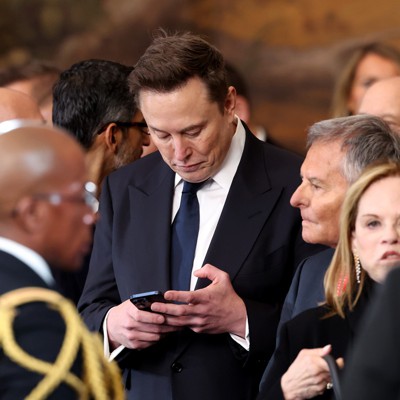When President Donald Trump moved back into the White House two weeks ago, he set up billionaire Elon Musk to lead an effort to shake up government operations. Some are warning that this effort, dubbed the Department of Government Efficiency, is shaking the foundations of the government itself.
“If this isn’t a constitutional crisis, I’m not sure what is,” said Donald Moynihan, public policy professor at the University of Michigan.
“This is a test of how much power we think the president has and whether that power goes beyond what the Constitution and the law says,” Moynihan said of the DOGE. “You have people within government — civil servants — who are now increasingly threatened for just raising basic issues of law and then being punished for that, while you have actors who are coming into government, in some cases teenagers, and engaging in dramatic abuses of federal power.”
Musk and his collaborators have reportedly accessed a variety of federal tech systems and databases and locked career feds out of others.
A lawsuit has also been filed over DOGE’s access to the government’s payment system at the Treasury Department. Treasury’s highest-ranking career official left the agency last week after he refused to give the DOGE access to that payment system. Musk’s statements and the DOGE’s access to the system have also raised concerns about the administration’s respect for congressional authority over spending power.
The administration is also trying to shutter the U.S. Agency for International Development, following Musk’s assertion that he and the president “agreed we should shut it down.” This has prompted dismay from Democrats, who point out that it takes action from Congress to shut down a government agency, as the Congressional Research Service has confirmed.
In another sign of the billionaire’s apparent influence, the Trump administration’s efforts to push federal employees out of the government by offering delayed resignations, which some have called legally dubious, also seem to echo Musk tactics when he took over Twitter, renaming it X.
Musk visited the Office of Personnel Management himself just days before the delayed resignation email went out, as Nextgov/FCW has reported, and has associates installed in that agency and others.
The White House confirmed on Tuesday that Musk is working as a special government employee, an executive branch position meant to provide limited services to government. But ethics and transparency concerns remain.
Musk is unlike the average special government employee, who typically has limited authority — on an advisory committee, for example — and doesn’t make decisions for the government, said former White House ethics lawyer Richard Painter.
“If [Musk is] running around, acting like a White House chief of staff, telling everybody what to do … there’s some good questions about whether he’s exceeding the authority that is ordinarily given to special government employees,” he said.
“Whatever his legal status is, and whether his activities are technically legal or not, this is the very definition of government corruption,” Walter Shaub, former director of the Office of Government Ethics, told Nextgov/FCW over email.
“Musk’s stupendous conflicts of interest are a threat to national security, as is his seemingly unsupervised access to sensitive systems containing the personal information of millions of Americans,” he said.
On his first day in office, Trump signed an executive order inserting DOGE into what was the U.S. Digital Service and also setting up a so-called temporary organization within USDS itself, which can take on volunteers.
Employees who were in USDS when it was made into the U.S. DOGE Service haven’t been included in recent, high-profile actions reportedly being taken by DOGE associates, one source familiar told Nextgov/FCW.
The order also mandates that agency heads should take “all necessary steps … to ensure USDS has full and prompt access to all unclassified agency records, software systems, and IT systems.” DOGE associates accessing government systems and data have raised alarm among cyber experts.
Musk — whose company, SpaceX, has billions wound up in government contracting — is bound by requirements to recuse himself from government matters he knows will have a direct and predictable impact on his financial interests, Painter said. As a special government employee, Musk is also supposed to file a private financial disclosure, although it doesn’t have to be made public, he said.
The businessman is limited to how much he can work in this type of position — 130 days a year, said Painter, noting that he’d expect lawsuits if Musk breaches that, in which case “a really good case could be made that he needs to file a publicly available financial disclosure report.”
The president can waive the conflict-of-interest statute, although that has “almost never” happened, said Painter.
The type of waiver Musk would be eligible for — which is subject to a high, strict standard and is rarely used — also cannot be issued retroactively, said Shaub, who noted that any potential volunteers working for the DOGE “temporary organization” are also covered by criminal conflict-of-interest laws that can’t be waived retroactively.
There is little oversight and transparency on ethics waivers, said Liz Hemopwicz, the deputy executive director of watchdog group American Oversight.
“When there’s weak oversight, those special government employees can use their temporary government roles to push policies that favor their employers, their clients, their investments, and ultimately, that degrades the services that the public receives for their tax dollars,” Hemopwicz said.
Waivers for the criminal conflict-of-interest statute are supposed to be public, Painter said.
The White House doesn’t have an inspector general — and Trump has also fired many agency inspectors general without following requirements to give Congress advanced notice — and the Office of Government Ethics doesn’t have any investigative power, he said.
“The system of government was based on a series of constraints that would prevent bad things from happening — where civil servants were aware of the law and they would raise red flags if the law was being broken, or inspectors general or general counsels within government. There were all of these internal actors in place to make sure that no one breaks the law, and that system is falling apart now,” said Moynihan. “What’s going to be left then are the external checks, so whether Congress or the courts get their act together.”
The White House maintains that Musk and his DOGE staff have followed the law.
“Elon Must is selflessly serving President Trump’s Administration as a special government employee, and he has abided by all applicable federal laws,” Karoline Leavitt, White House press secretary, said in a statement.
Asked what steps the administration was taking to address Musk’s conflicts of interest, Leavitt told reporters Wednesday that “if Elon Musk comes across a conflict of interest with the contracts and the funding that DOGE is overseeing, then Elon will excuse himself from those contracts.”
A White House official confirmed Wednesday that Musk has a top-secret security clearance. They also said that “those leading this mission with Elon Musk are doing so in full compliance with federal law [and with] appropriate security clearances” and that DOGE associates are working “as employees of the relevant agencies, not as outside advisors or entities.”
Shaub said all employees, or any potential volunteers, in the DOGE are also covered by criminal conflict-of-interest law.
A senior Democrat in Congress, meanwhile, has raised alarm bells about a memo issued by the new administration on its first day directing the White House counsel to grant top secret / sensitive compartmented information security clearances to designated personnel for up to six months, as Government Executive has reported.
“Since Trump handed Elon Musk the keys to our government, it’s been reported that Musk has set up private servers that risk a cybersecurity nightmare, sent out unsanctioned and untrustworthy resignation offers, and locked career officials out of agency systems,” that lawmaker — chair of the Oversight Committee Rep. Gerry Connolly, D-Va. — told Nextgov/FCW. “The actions of Co-Presidents Musk and Trump will have disastrous consequences not just for the civil servants whose lives they are upending, but for the American people who will suffer as a result.”
His Republican counterpart, chair James Comer, R-Ky., meanwhile, told Nextgov/FCW that “the Oversight Committee’s DOGE Subcommittee plans to work with Elon Musk and others to reform the federal bureaucracy, making it more efficient and effective for the American people,” adding that “DOGE is conducting a much-needed, government-wide audit to identify and prevent waste, fraud, and abuse of taxpayer dollars.”
Senate Democratic Leader Chuck Schumer, D-N.Y., has called the DOGE a “shadow government” and promised to push for legislation “to prevent unlawful meddling in the Treasury Department’s payment systems” with House Minority Leader Hakeem Jeffries, D-N.Y.
“I think there was some initial openness and potential goodwill there that reflected the fact that government does need to better use technology to improve services,” said Moynihan. The executive order setting up the DOGE in USDS was focused on tech.
“What we’re seeing so far, I think, is the version of DOGE that isn’t really interested in making government work better,” he said. “It’s interested in a smaller government and it’s doing so via a series of illegal actions.”
The Trump administration has characterized the alarmed reactions to DOGE as a resistance to change.
“The ongoing operations of DOGE may be seen as disruptive by those entrenched in the federal bureaucracy, who resist change. While change can be uncomfortable, it is necessary,” the White House official told Nextgov/FCW.
Read the full article here








Leave a Reply